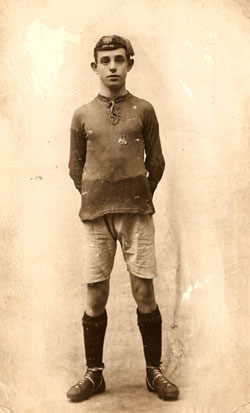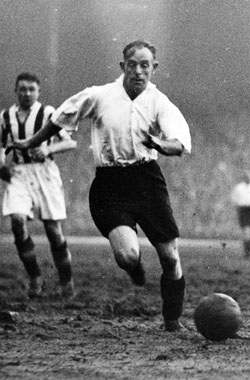
bobby gurney
Bobby Gurney cost Sunderland a £10 signing-on fee when he came from Bishop Auckland. The total cost of the players signed by Johnny Cochrane over several seasons in a vain attempt to replace him was over two thousand times more. Players such as Evelyn Morrison, Hooky Leonard, Jack Vinall, Harry Bedford, George Ainsley, Joe Devine, Benny Yorston and Jimmy Russell - experienced and proven goalscorers, including several internationals.
For Bobby Gurney though, Sunderland was his home club, his special club. Born in Silksworth in 1907, he played for Hetton Juniors, Seaham Harbour and Bishop Auckland before signing for Sunderland in 1925. After some prodigious goalscoring feats for the reserves, he made his debut at West Ham in April 1926, taking just 19 minutes to score the first of his 227 goals for Sunderland. His home debut a week later saw Bobby score again, netting an 87th-minute winner against Arsenal, and the local youngster became a first-team regular the next season. However, the first of two broken legs kept him out of action for a year before he returned to first-team action with a vengeance, scoring his first hat-trick against Arsenal. Bobby was to say later that, even at this time, he was still in awe of the senior Sunderland players, giants such as McInroy, England, Clunas, Parker and Andrews and was afraid to speak to them except to say "good morning". To recount season-by-season his goalscoring exploits would become tedious. Some special goals, though, do stand out. Seemingly impossible ones scored with his back to goal or from the by-line. Important ones like the last-minute equaliser against Wolves in the Cup in 1937. Or his five goals in a 7-4 win against Bolton, equalling the record of Jimmy Millar and Charlie Buchan.
Though he did play in several trials, Bobby Gurney's skills were, however, only recognised once at International level. Apart from a few wartime games, Bobby Gurney's Sunderland playing career ended with a broken leg in the FA Cup against Blackburn in 1939. He sustained the injury in the second minute, but typically returned to the field before being taken off at half-time. After he finished playing, Bobby Gurney stayed in the game as a coach and manager into the 1960s, though never achieving the same heights as he did whilst a player. He remained in the North-East until his death, and will be remembered as one of the greats. A great player, in a great team, for a great club. |
 And Bobby always knew that Cochrane wanted to replace him, to mould his own team. In those days, such things weren't spoken of openly, and on more then one occasion the directors overruled the manager's attempts to sell his local forward. To keep going under these circumstances, to play your heart out even when things aren't going for you, takes a special type of player.
And Bobby always knew that Cochrane wanted to replace him, to mould his own team. In those days, such things weren't spoken of openly, and on more then one occasion the directors overruled the manager's attempts to sell his local forward. To keep going under these circumstances, to play your heart out even when things aren't going for you, takes a special type of player. By this time, of course, the great Sunderland side of the 1930s was complete, and clinched the League title with a 7-2 win at Birmingham in which Bobby scored four times. Bobby Gurney reckoned, and probably rightly, that the half-back combination of Thomson, Johnston and Hastings turned the Sunderland team into a goalscoring force and said that it would have been impossible to play badly with Raich Carter, Jimmy Connor and Patsy Gallacher alongside you. Connor and Carter repaid these tributes, highlighting Gurney's skills in creating space, reading the game, always being available to receive the ball and, with great regularity, to put it in the net.
By this time, of course, the great Sunderland side of the 1930s was complete, and clinched the League title with a 7-2 win at Birmingham in which Bobby scored four times. Bobby Gurney reckoned, and probably rightly, that the half-back combination of Thomson, Johnston and Hastings turned the Sunderland team into a goalscoring force and said that it would have been impossible to play badly with Raich Carter, Jimmy Connor and Patsy Gallacher alongside you. Connor and Carter repaid these tributes, highlighting Gurney's skills in creating space, reading the game, always being available to receive the ball and, with great regularity, to put it in the net.